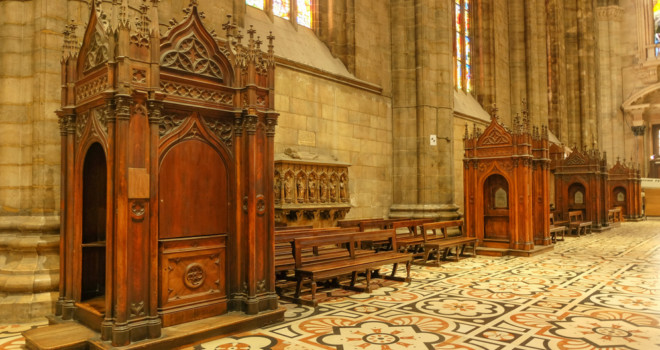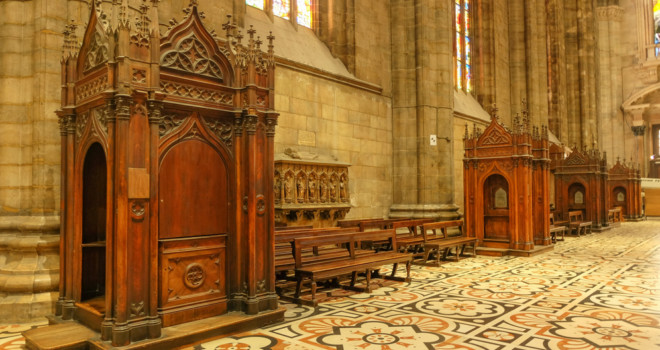It might sound odd for me to claim that Confession is one of my favorite sacraments, but how could it not be when I have found such tremendous mercy and redemption in it?
If I am merciful to
others in my ministry and teaching settings, it is because I have been shown
great mercy. More than once, I have been the prodigal son who runs off with the
wealth and blessings of the Father, waking up later in my filth and empty
self-centeredness, only to return to the open arms of a God who knows and
loves me with reckless abandon.
One of our Faith’s
greatest treasures is the sacrament of mercy itself, Reconciliation, commonly
called Confession. Now, I could point to the establishment of this sacrament
from the early Church councils, reference writings of the Church Fathers,
elaborate on Scripture’s encouraging us to confess our sins (1 John 1:9) and
gave His apostles the power to loose and bind sins (Matt. 18:18), but I prefer
to share with you the awe and appreciation I have for this holy mystery.
Confession has proven to be the steadfast
reminder of my fallenness and need for the mercy of God in order to run well
this earthly race.
A God of Grit and Grime
I realize that my love of Confession seems like a strange notion in our modern time. To confess anything implies that I committed a wrong. In our relativistic times, in which there is supposedly no objective truth and “sin” is a lost concept, can anything be wrong? Does sin even exist anymore?
To go before a priest in Confession and personally, bodily, and vulnerably own up to my sins certainly stands in sharp contrast to the airbrushed and flawless facade I’m expected to keep up online. We live in an age of disconnection, in which we can hide behind phone screens and digital barriers and block anything uncomfortable. We can manicure our social media presence to make sure we’re portrayed as spotless with the perfect filters. We can delete our flaws, block annoyances, and delete browser histories so we look as if we have nothing to hide.
But there’s a problem. We’re not perfect. We
all have things that we hide.
I know that I’m broken and wounded. I’ve felt the weight of sin on my soul, the compounded effects of lust, anger, self-centeredness, and spiritual laziness. I’m tempted to lie and steal. I’ve allowed myself to be in unhealthy relationships, driven by lust and insecurity. I’m immensely prone to sin. That’s not being neurotic; it is an honest diagnosis of the problem at hand. We can’t receive healing without first naming the disease.
There’s a human need to repent and conform ourselves to what is true. More often today, we attempt to do so through incomplete, imperfect and even distorted means, such as therapy and reveal-all moments on daytime talk show. People post way-too-revealing details of their lives online because of a sincere need for human connection and for the truth to be known. We desire to be seen and loved for the wholeness of who we are, no matter how we try to bury the details.
Religious or not, we have an instinctive
revulsion to liars and to being lied to. We value men and women of integrity
who walk uprightly, whose behavior matches their talk. Immoral actions done in
secret eat away at us because we’re living in darkness. We desire the truth and
to live in the light of truth. The truth sets us free and brings healing.

The beauty, of course, is
that through Jesus Christ we are offered far more than a cathartic moment on a
talk show: we are offered a real return to the wholeness for which we have been
made. Jesus is the Truth that can dispel our falsities and infirmities, but
only if we first confess that we have a need to be healed.
Often when Jesus encountered the sick, He would bring healing to the soul just as readily as to the body. When men brought their paralyzed friend to Jesus to be healed, Jesus first forgave the man’s sins (Matt. 9:18). The Apostle James encouraged the sick, “Confess your sins to one another and pray for another, that you may be healed” (James 5:16). Confession brings a real interior and exterior healing
Only God can forgive
sins, of course. The Pharisees were horrified when Jesus claimed the authority
to forgive sins, because He was essentially equating himself with Yahweh, the
God of Abraham, Isaac, and Jacob. Such a claim intimated the fantastic idea
that God would deign to take on crude flesh to live in our grit and grime and
walk among us.
That was precisely what God deigned and did.
Returning to the Father
Hours before we were married, my wife and I went to Confession separately, wanting to enter into marriage as free as we could be. We confessed times when we gave away our love to individuals who didn’t deserve it and times when we ourselves failed to love as we should. I knew that through years of viewing pornography, I had given myself to so many other women, but that through God’s grace my mind and memory had begun the healing process. On our wedding day, we wanted to come together without any reservation of our past and be intimately one. And that’s what Confession is all about.
The word “Reconciliation” emphasizes a
return to intimacy with God. The hint of spousal love is not accidental; it is
exactly the point. God wants us to be present with Him in each moment with that
level of spousal unity. Sin isn’t the mere breaking of a rule, but the severing
of a loving relationship. Confession is the rightful movement back to the
Divine Lover, who longs for our return.
“Return, Israel, to the Lord your God,” said the prophet Hosea to his people in exile (Hos. 14:2). Time and time again, the Hebrew people forgot the goodness of the Lord, and yet God stood steadfast as only a lover could. Time and time again, we are tempted to walk away from the Lord’s goodness, yet God waits on our return. Through the imperfect priest, we are given access to the Perfect Lover of our souls.
Pope Francis stated that
it’s not God who tires of forgiving us, but we who tire of asking for
forgiveness. I know that I experienced shame and frustration with having to
return to the sacrament week after week for issues of lust in my college years.
I would go to different parishes, worried that the priests would start
remembering me. Of course, I was missing the point that I needed to be held
accountable and that God was always, always waiting there in the priest to
receive me back into that intimate relationship with Him.
Now that I’m a parent, my children, of course, do things that try my patience and push me to anger. My anger with them lasts but a moment, and in the next instant, I try to console, reconcile and shower love on them. God the Father sees us with such infinite love that no sin we ever commit can separate us from Him. But we must be humble enough to say, “Forgive me, Father, for I have sinned.”
Go and Sin No More
The answer to the moral
crises of our time is to live in holiness. In every time of trial for the
Church, great saints have risen to lead the response, souls humble enough to
admit that they are sinners in need of a Savior.
At the end of each
confession, we say an Act of Contrition, in which we assert our intent to
avoid whatever leads us into sin. There is a danger of treating Confession as
a quick car wash when we frequent the sacrament without committing to changing
problematic behaviors and habits. This cheapens the divine mercy God offers us
through the blood of Christ.
How serious are we about living this call to repentance? We must be “all in.” We must be willing to get to the roots of our habits and to see where our
wounds originated. “If your eye causes you to sin, pluck it out” (Mark 9:47). I have friends who have downgraded their phones to “dumb phones,” so that they could be free of their endless temptations to lust, envy, and sloth. I installed software on my computer years ago to help me overcome pornography use and hold me accountable, for the sake of my soul and my future vocation. It’s not easy, and it takes time. But through our examining the origins of our scars, God is glorified and we can be transformed. Behaviors can be corrected and wholeness can be achieved with the assistance of the Divine Healer.
Pardon and Peace
“For freedom Christ has
set us free” (Gal. 5:1). God did not send His only Son so that we might have
more rules and live in fearful, neurotic guilt, but that we might have life in
abundance (John 10:10). A life lived in the divine love and truth will truly
set us free.
I try to go to Confession at least once a month. St. John Paul II would go once a week—what the pope had to confess, only God knows! The holier we become, the more we see our selfish tendencies and flaws and see the great distance between who we are and who we could be. The great saints attest to this fact. But still God pours His grace out upon those humble enough and persistent enough to ask for it.
Experience the healing God wants to pour out upon you. Return to the intimacy of God in this treasured sacrament of the Church.
Confess and believe in the glory of God!
✠
This article is from the book Spirit and Life: The Holy Sacraments of the Catholic Church. It is available from Sophia Institute Press.














